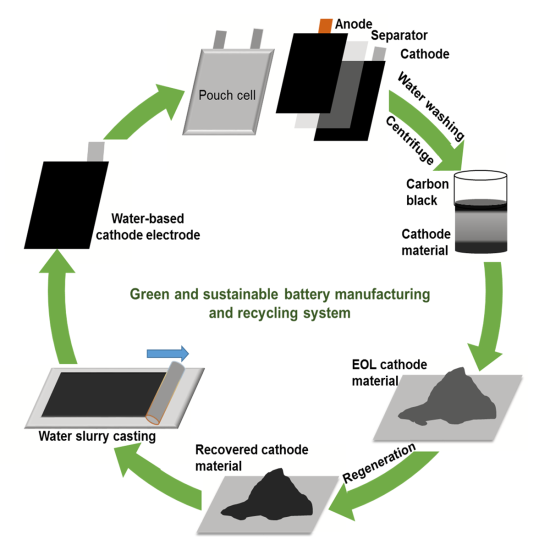What if we could make the process of making LIBs (Lithium Ion Batteries) a lot safer, their use less hazardous, and their recycling a low-risk enterprise? Virginia Tech researchers think they have positive answers to all three questions. By substituting water for organic solvents normally used in making LIB electrodes, researchers at Virginia Tech (Virginia Polytechnic Institute and State University), “…found that the electrodes fabricated via water-based processing demonstrate comparable rate performance and cycle life to the ones from conventional solvent based processing.” Beyond that, in a seeming bit of alchemy, using water-based processing with a water-soluble binder, “…enabled recovering the cathode compound from spent electrodes using water, which could be successfully regenerated to deliver comparable electrochemical performance to the original, pristine electrode.” “Humongous” Amount of NMP N-methyl-2- pyrrolidone (NMP), used as a solvent in making LIB electrodes, is expensive and harmful to reproductive functions. It was added to the European Commission’s restricted list in 2018. Despite those concerns, one …
Raising Cane at the Battery Works
What if a battery could be made with higher energy and power densities than those currently available, while exploiting a natural material that’s both abundant, recyclable and inexpensive? Last year, the blog reported on Y. H. Percival Zhang’s work with xylose, a sugar found in most plants, to make hydrogen that could be used in fuel cells. Dr. Zhang, with a Ph.D. in chemical engineering and biotechnology from Dartmouth University, draws on his unique pair of specialties to inspire his forays into developing novel ways of extracting energy from natural sources. His latest effort is a battery that runs on maltodextrin, a polysaccharide made from the partial hydrolysis of starch. That starch can be derived from almost any type of plant, a ubiquitous and non-food-based source. This makes for a tidy life cycle, extracting the raw materials from nature and being able at the end of the battery’s long and refillable run to return them to nature without fear of …
Hydrogen as a Biofuel?
While we’ve written recently about “artificial leaves” that emulate the photosynthesis of their real counterparts, researchers have announced the discovery of a way to extract hydrogen from any plant, which “could help end our dependence on fossil fuels,” according to Y. H. Percival Zhang, associate professor of biological systems engineering in the College of Agriculture and Life Sciences and the College of Engineering at Virginia Polytechnic Institute and State University (Virginia Tech). The school describes the process as a “breakthrough that has the potential to bring a low-cost, environmentally friendly fuel source to the world.” Zhang has been working on the problem for over seven years, and like many pioneers, has endured the critical appraisal of those not in tune with his aspirations. Esquire magazine in its November 2006 issue labeled Zhang’s early iteration of his idea to break down plant sugars to create cheap cellulosic ethanol and possibly even hydrogen as the “Crazy idea of the year: “sugar cars.” …

